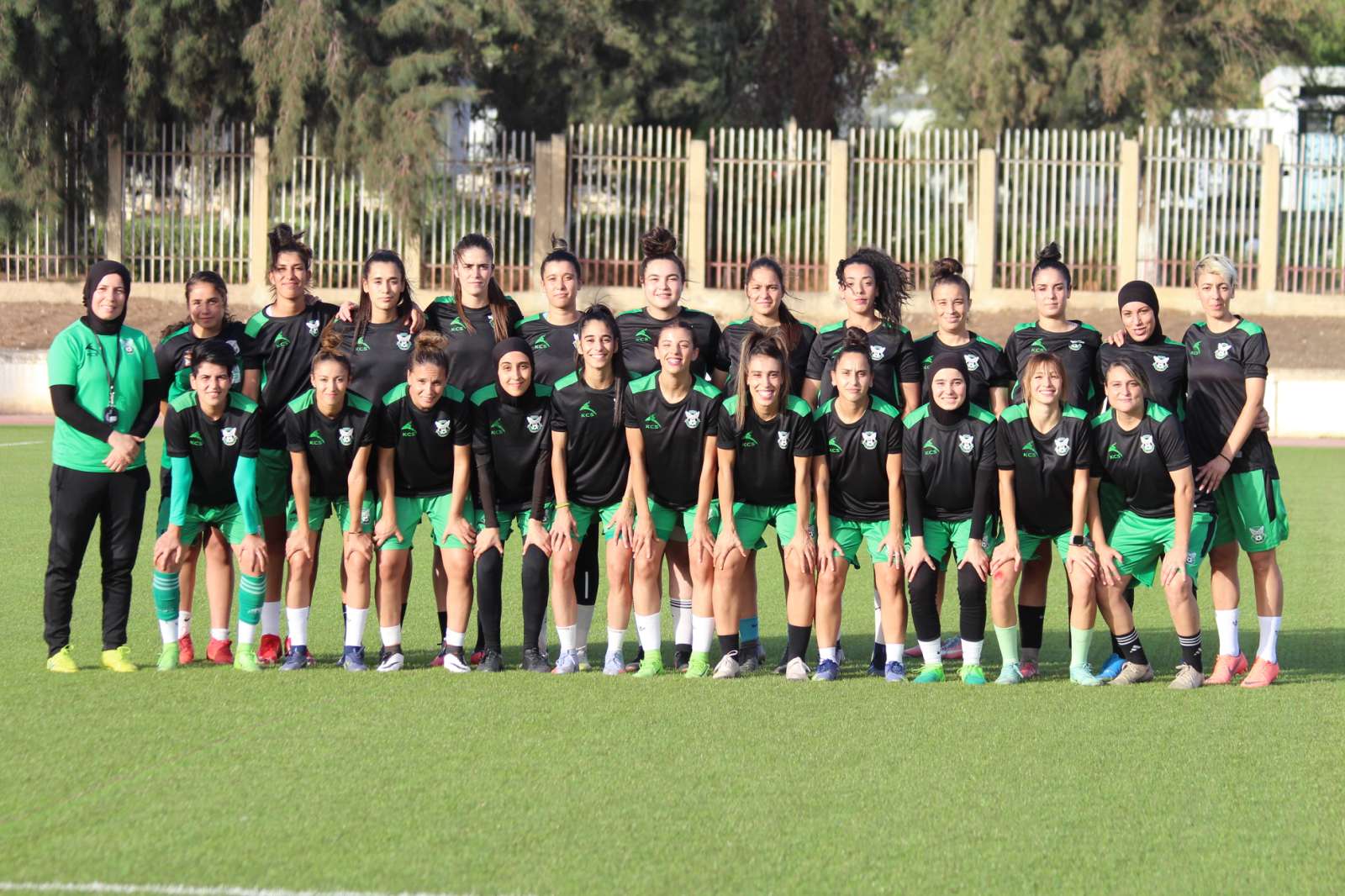Rania Fergani, a former player of the club and a Constantine native, believes that the best way for women’s football to impose itself in a conservative society that still sees the sport as a men’s monopoly is to “work seriously and win as many trophies and continental and international participations as possible. In addition to continued formation. And why not, even international titles .Maybe then the sport will gain the place it deserves”.
When it comes to her family’s attitude toward her football practice, she says that she “got all the support she needed from her family, especially from my father. He was so proud when I played for the U17 national team during the Arab Championship. He was telling everyone that that player is… his daughter”.
Khouloud Ouarnani, the 19 year old CSC player who was born in Algiers, proudly retells how she climbed through age categories after she started playing football on the street when she was ten years old. She says that her family accepted her passion with warm hearts, except her brother, who “did not tolerate it until he first saw me on television among the main formation of the national team”.
Despite her accomplishments, adds Khouloud, she faced rejection from her family when she decided to play for CSC. “My father could not easily accept the idea of me moving to a different city and I had to make some sacrifices in order to advance my sports career. Now my father is very proud of what I’ve become”.
On society, she believes that Algerians “do not yet accept that women share football with them. They still hold a bad view on women football players here, but that does not affect our determination at all”.
Zineb Kandouci holds the same belief. She was born in Naama and she is playing her first season with CSC. She went through several teams after starting with Afak Ghelizane where she climbed age categories and won several trophies.
Zineb thinks that society’s image of women who play football is still “fossilized”. “I hear ‘go back to the kitchen’ a lot, ‘you’re not made for football’, but that doesn’t matter a lot, especially when we meet others who encourage us to play our favorite sport. They are even happy that we represent CSC. In addition to my family’s unwavering support. My mother is ecstatic every time I win a trophy and that is enough for me”.
The women’s team of Club Sportif de Constantine was established on June 8, 2004 by coach Radhia Fertoul, under the name “Girls of Wiam Constantine”. It continued under that name until May 2022 when the coach signed a merging agreement with ENTP, CSC’s parent company. The team then began preparing for the national championship on August 1st, 2022 as the first professional women’s team in Algeria.
The women’s team of Algeria’s oldest club currently plays in the national amateur division, which will become the women’s professional league starting next season. In addition to the senior ladies team, CSC also has a U17 and a U20 team, established in 2011.
Iron will
CSC, formerly “Girls of Wiam Constantine”, has fed the national team with several teams in many categories. National women’s team coach Farid Stiti has called up CSC players Imene Merrouche (forward) and Fouzia Bakli (defender) to take part in the training camp preparing the national team’s participation in the 2024 Africa Cup of Nations which will take place in Morocco.
The senior team holds a trophy-ridden record. They won the Super Cup in 2016, the national championship in 2018, the Republic’s Cup in 2018, the League’s Cup in 2019. They also reached the Republic’s Cup final 7 times, and the League’s Cup final twice. They came second in the championship 3 times.
The younger teams have also won several titles. The U20 girls have won the championship 3 times, in 2011, 2013 and 2016. They came second once and reached the Republic’s cup final twice. The U17 won the 2016 championship and reached the cup final once.
The team hosts its championship and cup opponents at the Abdelmalek Ramdane stadium, which contains an appropriate field, stands and other amenities. They hold most of their training sessions in the same stadium. The atmosphere there is one of sportsmanship, seriousness, team spirit and group work despite the differences in accents and mentalities which created some friction at first for coach Radhia Fertoul who insists on overcoming differences between players after giving them the right conditions. The team includes 13 players who came from Algiers, Tizi Ouzou, Naama, Bouira, Bejaia, Ghelizane, Chlef, Tlemcen and Skikda.
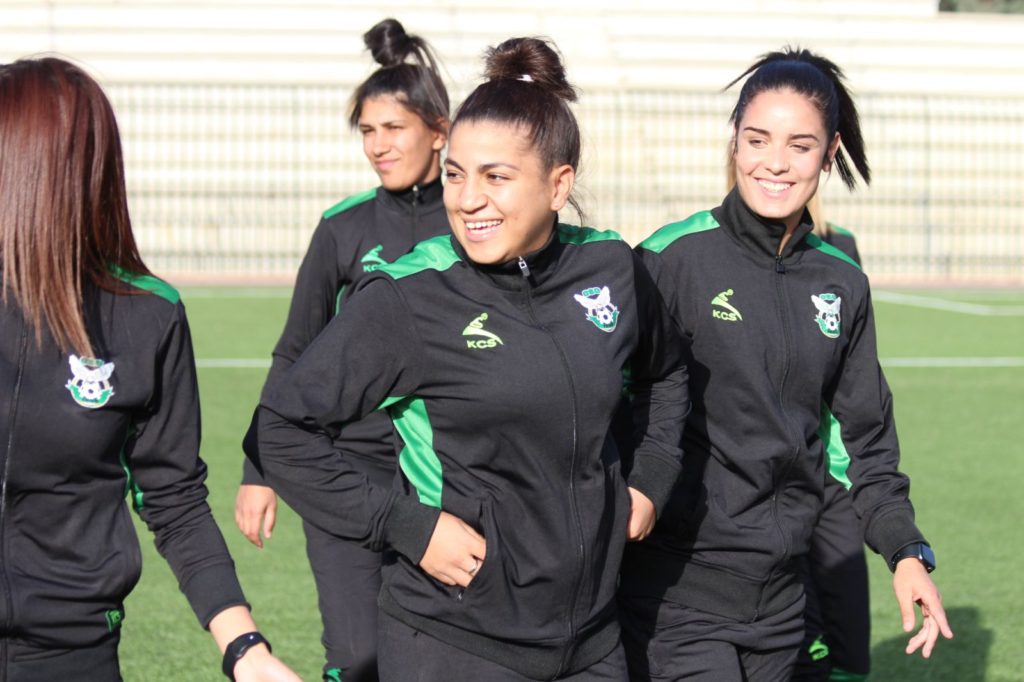
Nouara Serrai, Khouloud Ouarnani and Noura Bouaita 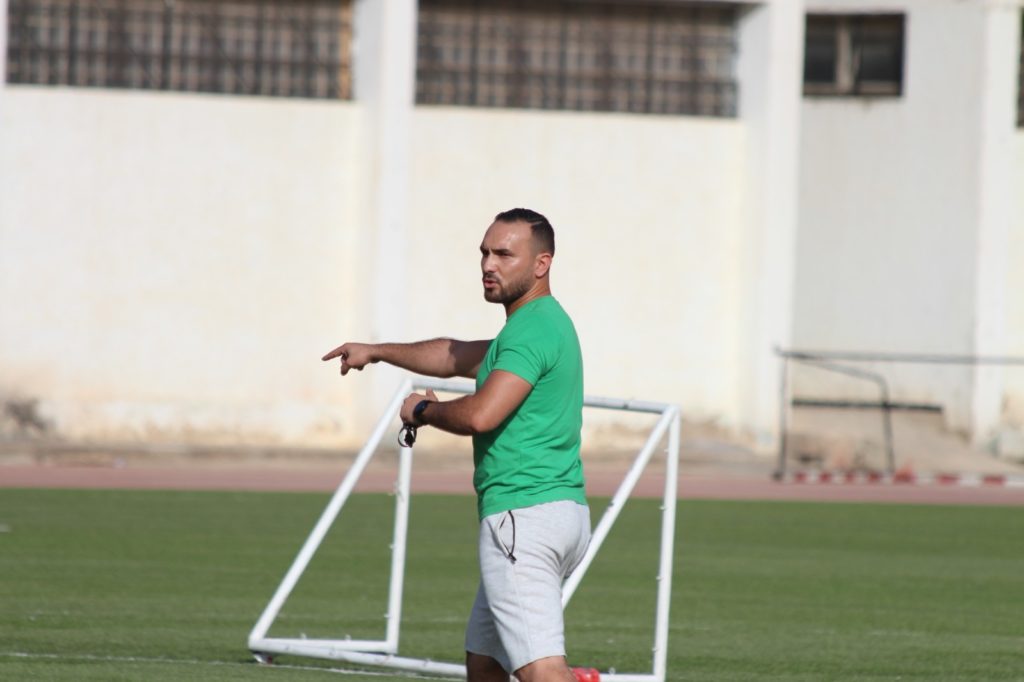
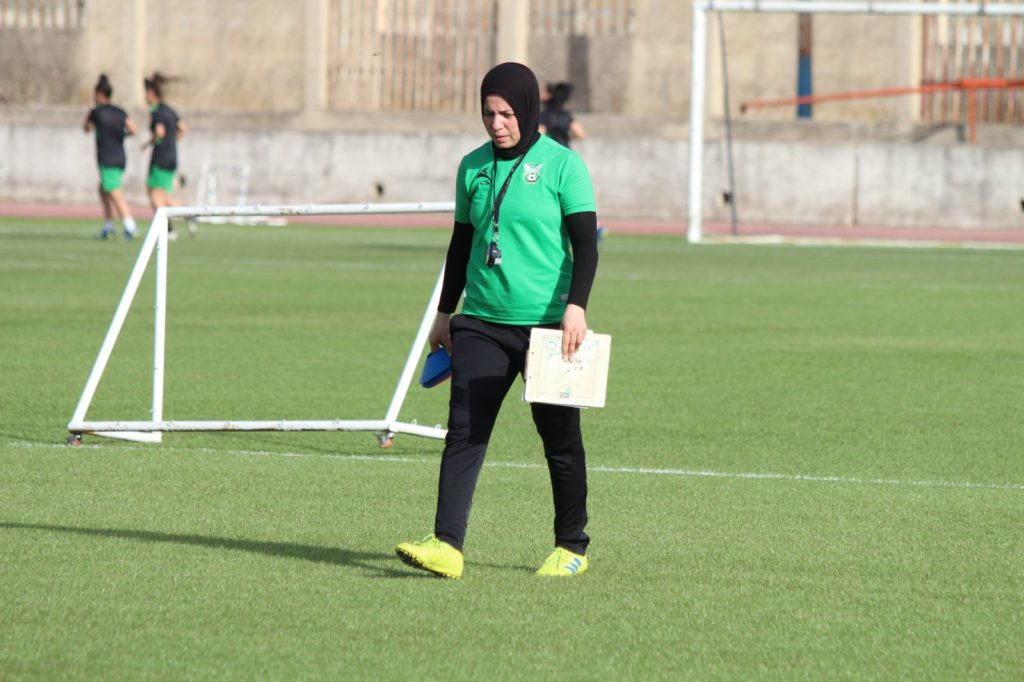
Coach Radhia Fertoul 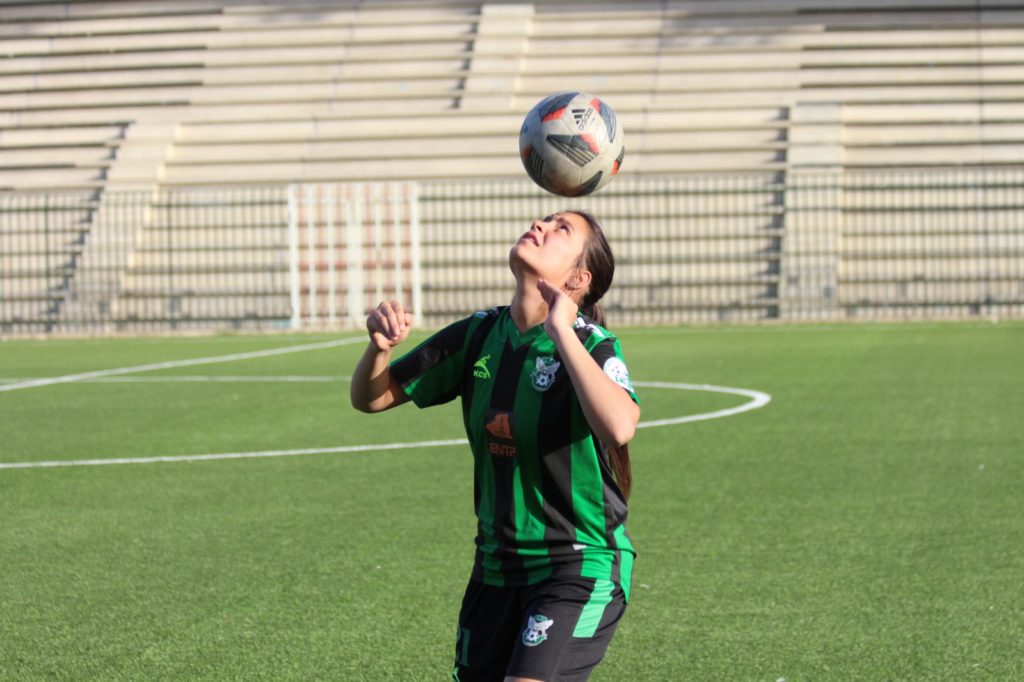
Bouthaina Soualmia 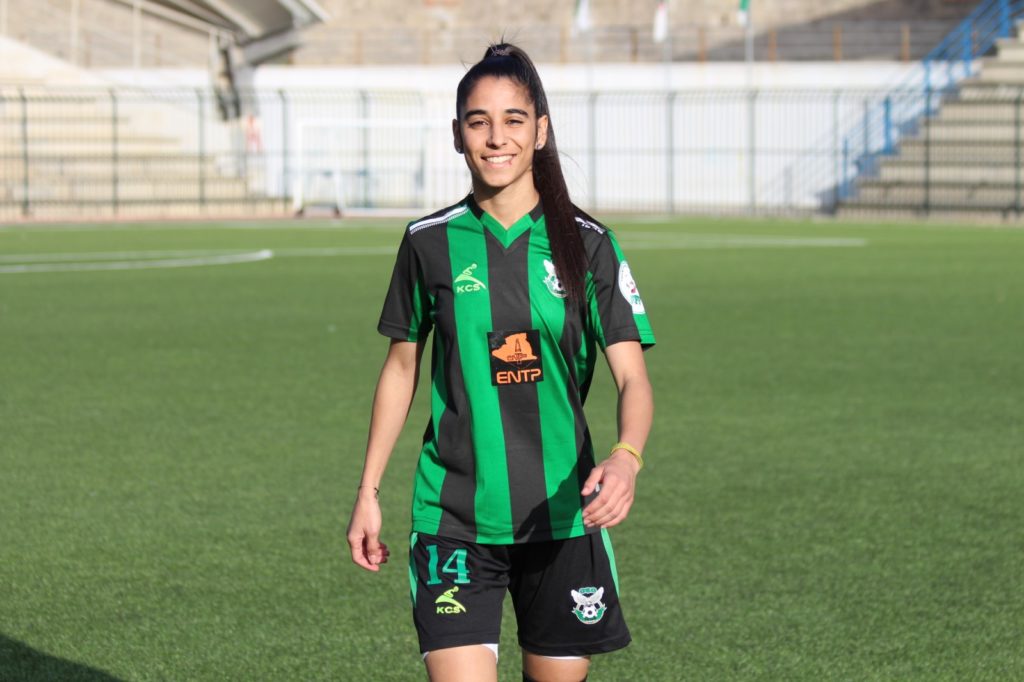
Wassila Allouache 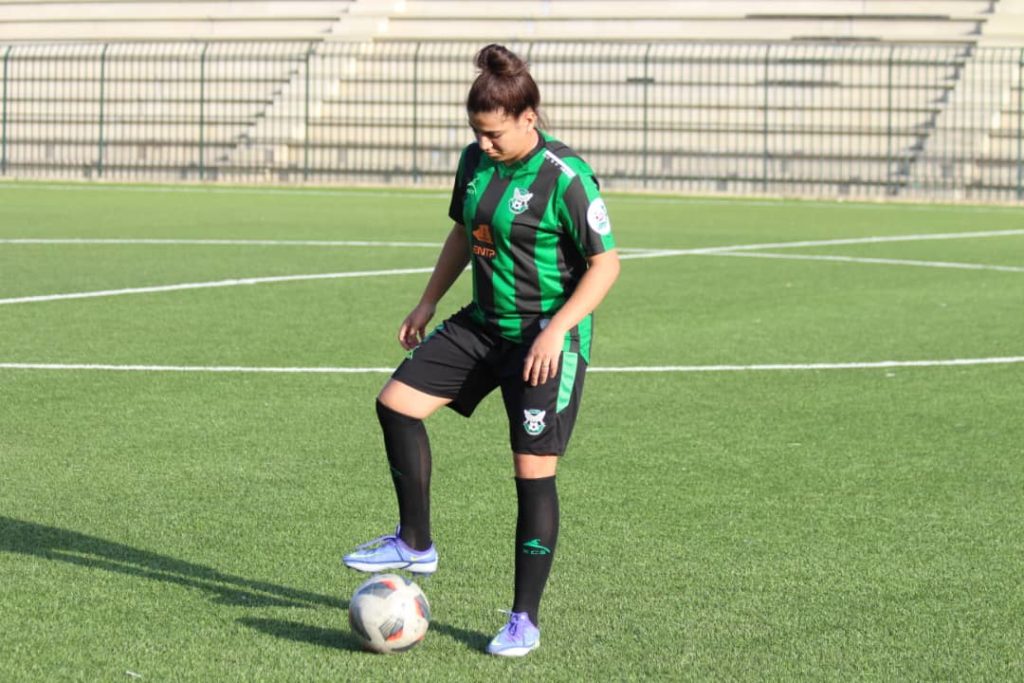
Khouloud Ouarnani
Football is undisputed as the popular sport in Algeria. Algerians love football and have done so for a very long time. But football remained a men’s sport, and it appears that the masculine dismissing view towards everything feminine still dominates the mentality of some football executives in Algeria, whether on the official front or inside teams.
Despite the accomplishments of the women’s team of CSC, and despite the determination of its management to promote women’s football, the team is still struggling. The same goes for the 9 other women’s teams in the Super League. Many obstacles and hurdles still exist. The girls have to struggle almost everyday for access to the training grounds they share with men’s teams who play in the second league and others. They sometimes have to train at night but face refusal from the stadium management to turn the ground lights on. That does not happen when the men train at night.
Women’s teams from the Super League also complain about the conflicting calendars between championship and cup games, about the early scheduling (9 and 10 A.M.) of games, about the catastrophic state of playing grounds at most stadiums which do not meet the basic standards for hosting sporting events. In addition to marginalization and lack of press coverage despite all the trophies and titles.
International football authorities, FIFA and CAF, make it mandatory for all professional clubs in the world to have women’s teams. Most football federations, except some from Africa and South America, have met this requirement. FIFA has threatened to sanction federations who do not meet these conditions which aim to promote women’s football. The latter has started to establish itself among football fans around the world.
In Algeria, though, women’s football still struggles to impose itself amid bureaucratic and administrative problems. It also faces some opposition from society. Those in charge of the sport aim to impose its presence. This is the case of the women’s team of Club Sportif de Constantine, led by its coach and founder Radhia Fertoul, whose ambition, according to her, is to make Algerian women football competitive on the international stage.
